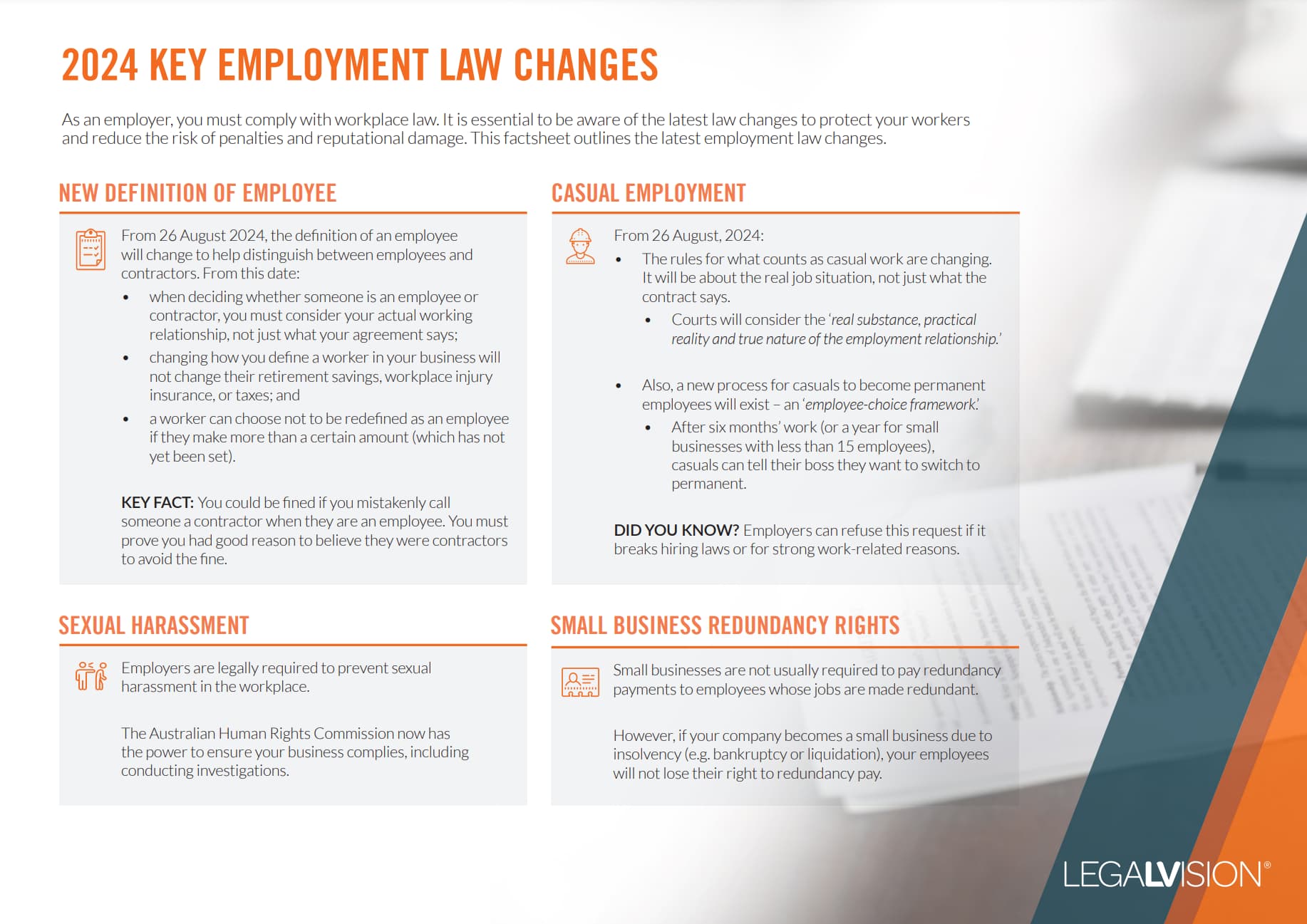In Short
-
You can terminate an employee before they start if the employment contract specifies conditions like commencement upon attending work.
-
If employment has commenced, you must adhere to the National Employment Standards (NES), including notice periods and entitlements.
-
Avoid discrimination and misleading conduct during recruitment to prevent potential legal claims.
Tips for Businesses
To minimise risks when revoking a job offer, ensure your employment contracts are clear and conditional on factors like reference checks and background verifications. Clearly state that employment commences upon the first day of work and include clauses addressing false information or misleading conduct. This proactive approach can help protect your business from potential legal challenges.
If you wish to terminate an employment offer before an employee commences work, there are several legal factors to consider. The circumstances surrounding the termination, such as the employment contract terms, National Employment Standards (NES), and potential discrimination issues, will influence your ability to lawfully revoke the offer. This article outlines the key legal considerations to keep in mind.
Employment Contract
The first step in determining whether you can terminate an employee before they start is to examine the terms of the employment contract. If the employee has already signed a contract, it may specify conditions under which the employment is contingent on their attendance or successful completion of certain requirements, such as medical assessments or background checks). If these conditions are not met, you may have grounds to terminate the offer.
For example, if the contract states that employment only commences when the employee reports for work on their first day, you can generally revoke the offer if the employee has not started. However, if the employee has already begun work, the contract may include probationary periods and notice requirements that must be observed.

As an employer, it is essential to understand what employment laws have changed and their implications for your business — particularly the changes to the Fair Work Act 2009 through the new Closing the Loopholes legislation.
National Employment Standards (NES)
The NES sets out the minimum employment entitlements in Australia, which you must provide to all employees. Under the NES, employees are entitled to a minimum notice period for termination once they have commenced employment. However, if the employee has not yet started, they do not have an entitlement to a notice period.
Discrimination Considerations
It is crucial to ensure that the reason for terminating the offer is not discriminatory. Under anti-discrimination laws, it is unlawful to revoke a job offer based on factors such as pregnancy, race, religion, gender, sexual orientation or disability. If an employee discloses a medical condition or criminal history that impacts their ability to perform the inherent requirements of the role, you may have grounds to terminate the offer. However, such decisions must be based on the role’s essential duties and not on discriminatory factors.
Continue reading this article below the formMisleading and Deceptive Conduct
Employers must avoid making misleading or deceptive statements during the recruitment process. If you have made promises or representations about the nature of the job, working arrangements, or conditions, you must ensure that these are accurate. For example, if you promised remote work but later require the employee to work in the office, this may be considered misleading, potentially leading to a compensation claim under consumer protection laws.
Compensation Claims
If an employee has relied on an offer of employment and subsequently resigned from their previous job, revoking the offer could expose you to claims for compensation. The employee may argue that they relied on the offer and incurred financial loss as a result of their resignation. If the revocation is due to a background check failure or failure to meet employment conditions, it may be defensible. However, if the decision is based on a change in preference for a different candidate, you may be required to provide compensation.
Best Practices for Protecting Your Business
To mitigate the risk of legal complications when terminating an offer before the employee starts, ensure that the employment contract includes clear terms, such as a clause:
- specifying that the offer is conditional upon successful completion of background checks, medical assessments, or other conditions;
- stating that employment only commences once the employee reports for their first day; or
- allowing for immediate termination if false information is provided by the employee during the recruitment process.
By including these provisions, you can protect your business and minimise the risk of disputes.
Conditional Employment Offers
In some cases, it may be beneficial to include a conditional offer period in the employment contract. This allows you to make the offer subject to specific conditions, such as passing a medical assessment or completing reference checks. The contract should clearly outline that you may withdraw the offer if the employee does not meet the conditions.
Key Takeaways
Terminating an employee before they start work is possible under certain circumstances. The main factors to consider include the terms of the employment contract, particularly any conditions regarding the commencement of employment. Additionally, employers must ensure compliance with the National Employment Standards (NES), especially concerning notice periods and entitlements. It’s also essential to avoid any discrimination or misleading conduct during the recruitment process to ensure the termination is lawful.
If you are hiring new employees, our experienced employment lawyers can assist as part of our LegalVision membership. For a low monthly fee, you will have unlimited access to lawyers to answer your questions and draft and review your documents. Call us today on 1800 875 477 or visit our membership page.
Frequently Asked Questions
Yes, you may terminate an employee before they start, provided the terms of the employment contract allow for it and the reasons for termination comply with applicable laws.
Ensure that the employment contract clearly outlines conditions for the job offer, such as passing background checks or medical assessments, and includes provisions for terminating the offer.
We appreciate your feedback – your submission has been successfully received.











